
Making Light of Serious Business
George Guidoni
Converting Design & Innovation Sustainability Cartoning Design Paperboard Packaging Printing Astro Box Corporation FSC (Forest Stewardship Council) Kallima box™ Komori Corporation Komori Lithrone 40 Rayonier Advanced Materials TembecFamily-owned boxmaker runs up the score on packaging sustainability with lightweight new paperboard offering customers a more earth-friendly packaging solution
The bright lights of New York City are often at their brightest during an NHL or NBA game at the city’s storied Madison Square Garden sports arena.
And while it’s clearly the players showing off their athletic prowess to thousands of adoring New York Rangers and New York Knicks fans that are the center of attention, many of those fans may soon also develop a fondness for the new popcorn boxes making their debut at the venue’s concession stands this season.
And many of them would be surprised to learn that the crisply-printed lightweight boxes—elegantly decorated with the official full-color team logos, graphics and slogans for both sports franchises—have in fact been shipped from an unassuming, 30,000-square-foot package printing facility operated just north of Toronto in Vaughan, Ont., by the family-owned folding-carton converter Astro Box Corporation.
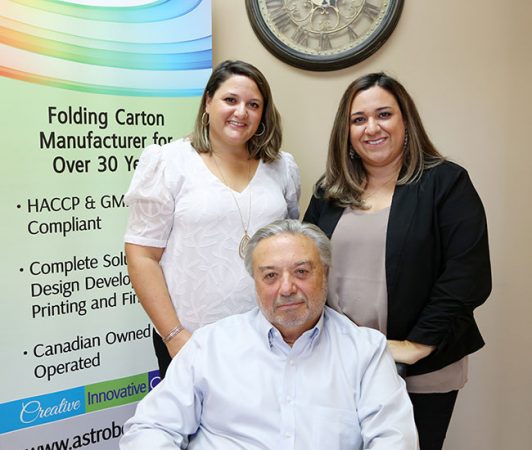
Astro Box Corporation’s founder and president Charles Parlagreco is flanked by his daughters Laura and Daniela, both part of the second generation of the family company’s ownership structure, at the front office of the boxmaker’s 30,000-square-foot production facility in Concord, Ont., which is a fully HACCP (Hazard Analysis Critical Control Points)-compliant facility maintaining the strictest standards for product and workplace safety.
Founded in 1982 by Charles Parlagreco, a recent arrival to Canada from his native Italy with little more than an electrical engineering college diploma and the clothes on his back, the words “humble beginning” are arguably an understatement when talking about the 37-year-old company’s early days.
“When I arrived in Canada at the age of 20, I hardly spoke a word of English,” recalls Parlagreco, who began his new life by working for a Toronto Paper Bag Manufacturing company owned by his future father-in-law.
After doing that for over four years, Parlagreco went to work for Toronto Hydro, putting his college education to good practical use.
But after five years of desk work at the utility company, Parlagreco got restless.
“I just could not see myself doing it for another 20 years,” he relates, “so after consulting with my family and obtaining a startup loan from my father-in-law, I invested in my first used letterpress, a two-cylinder machine with zinc plates, and began printing paper cartons in a corner of his shop.”
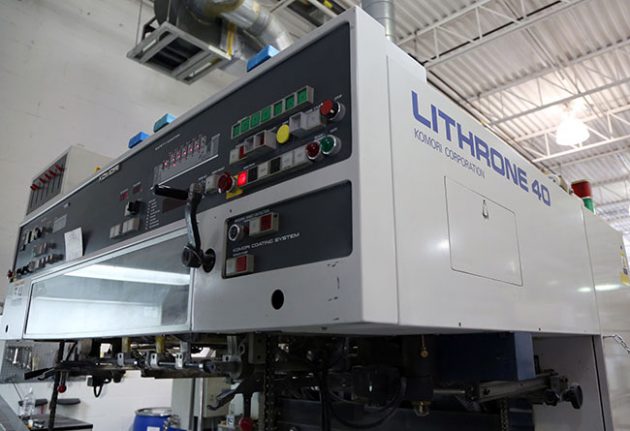
Manufactured in Japan by the Komori Corporation, the Lithrone 40 sheetfed six-color printing press with inline aqueous coating is the Vaughan facility’s primary workhorse handling all of its printing jobs with reliable consistency and high-quality finishing across a broad range of paperboard grades and thicknesses.
After his father-in-law introduced Parlagreco to his first customer, a once-popular Open Window Bakery in north Toronto, Parlagreco upgraded his letterpress to start using rubber printing plates to obtain the desired print quality, while learning as much as he could about die-cutting from a local die-maker.
“I was doing all this while still working full-time at Hydro for the first three years,” he recalls, “learning everything about the print business from scratch.”
Parlagreco says that working a staggered shift schedule at Hydro allowed him the flexibility to find time for his budding new business venture—albeit at a considerable personal sacrifice.
“I was getting about eight hours of sleep a week,” he recounts, “but being in my 20s and having a strong ambition to succeed, helped me manage to get through it all.”
Once his fledgling operation got too big for his borrowed workspace, Parlagreco rented a space next door to the paperbag facility and installed his first lithographic printing press—laying foundations for what is now a highly respected supplier of a versatile range of high-quality paperboard packaging to the Canadian food processing and grocery retail industries.
Says Parlagreco: “From the outset, Astro has always tried to set itself apart from the competition by providing the best service possible to our customers, with the quickest turnaround times.
“We thrive on finding ways to improve customer packaging so that it’s more environmentally-friendly, runs better on their production line, or is easier for their employees to handle,” he states.
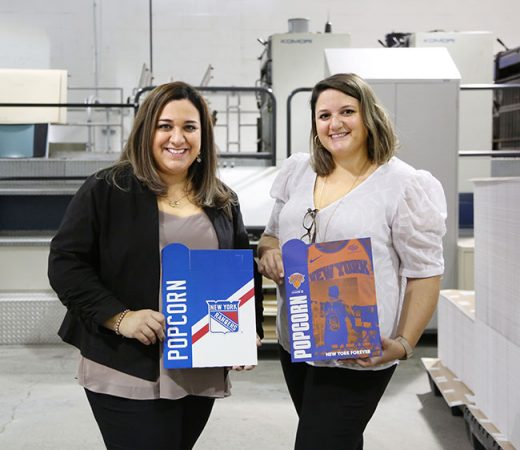
From Left: Daniela Parlagreco joins her sister Laura on the shop floor to show off the high-impact popcorn boxes the company supplies to the Madison Square Garden in New York City, which are made with Kallima box paperboard.
“We pride ourselves on product development, loving nothing more than designing entire product lines from the ground up.
“Hearing our customers call us ‘problem-solvers’ is the highest compliment we can get.”
As a family-owned and operated business, Parlagreco says he is immensely proud to see two of his three daughters join the company’s management team, with vice-president of administration Daniela Parlagreco coming on-board in 2007 and vice-president of operations Laura Parlagreco following suit in 2010.
“We run the company with family values in mind,” Charles Parlagreco told Canadian Packaging on a recent visit to the Vaughan facility, housing Astro Box since 2010.
“We treat our employees, customers and suppliers alike with the highest respect,” he says, adding that some of the plant’s 30 full-time employees have been with the company for over 30 years.
During that time, many of them have played key roles in enabling Astro Box to evolve into a full-service paperboard packaging supplier operating in a clean, safe and fully HACCP (Hazard Analysis Critical Control Points)-compliant environment meeting all the relevant GMP (Good Manufacturing Practice) standards and requirements.
“We work very hard to maintain a clean, safe and efficient plant that protects both our employees and our customers,” states Laura Parlagreco.
“We run our plant in much the same way as a food processing plant would, tailored to our Food Safety Enhancement Program (FSEP) and GMPs.
“Our facility is very bright, clean and well-maintained,” she says, citing the average 99-percent approval rating from the annual third-party audits of the plant’s HACCP/Preventative Control Plan program implementations.
With annual capacity to convert 4,000 metric tons of boxboard, the plant employs a state-of-the-art, sheetfed Lithrone 40 six-color lithographic printing press with inline AQ (aqueous coating) to print a broad range of paperboard grades, utilizing high-quality ink purchased from Sun Chemical Corporation.
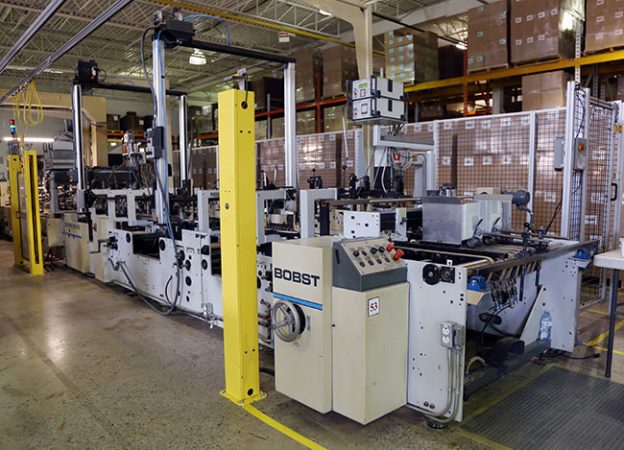
A backside view of one of the two high-performance Bobst folder-gluers installed at the Vaughan plant as part of the company’s continuous capital investment efforts that also include installation of an Iberica blanker and a Kohmann window-patching machine.
Manufactured in Japan by Komori Corporation, the Lithrone 40 sheetfed press at Astro Box runs at speeds of up to 15,000 sheets per hour to produce vibrant and colorful images on paperboard up to 40 inches in width and 28 inches in height.
“It has been a real workhorse for us ever since we purchased and installed it back in 2001,” says Laura Parlagreco, adding that the multi-million-dollar press remains the company’s biggest ever single capital investment to date.
Over the last few months, the Komori Lithrone 40 press has been increasingly used to process a new lightweight grade of paperboard manufactured in the province of Quebec by Rayonier Advanced Materials.
Headquartered in Jacksonville, Florida, RayonierAM is a global manufacturer of high-purity cellulose, paperboard, lumber, newsprint and high-yield pulp.
Two years ago, RayonierAM completed the acquisition of Quebec-based forestry firm Tembec—opening another new chapter for the company by significantly increasing its presence in the paper and paperboard markets.
Marketed under the Kallima box™ brand name, the FSC® (Forest Stewardship Council®)-certified paperboard (FSC® C017431) is a three-ply FBB (folding boxboard) produced in Temiscaming, Que. Now available in 14 pt., 16 pt. and 18 pt. thicknesses, the low-density multi-ply construction offers significant weight savings, compared to thicker board grades.
At the same time, the thicker 18 pt. grade that Charles Parlagreco calls the “bull’s-eye of the folding-carton market today” enables converters to achieve exceptionally high print quality on cartons, shelf displays, POP (point-of-purchase) displays, etc.
As RayonierAM’s Vice President of Sales and Marketing Martin Lavoie relates, “Our customers from the commercial print markets have come to appreciate the main benefits of Kallima—such as its lower basis weight and its North American footprint.”
“We are now pleased to offer this unique combination of advantages to packaging converters,” says Lavoie, noting the lightweight board’s impressive strength, impact resistance, versatility and machinability on a diverse range of printing and packaging equipment.
For his part, Charles Parlagreco is exceptionally pleased with being able to source the innovative Kallima box board from a Canadian-based manufacturer.
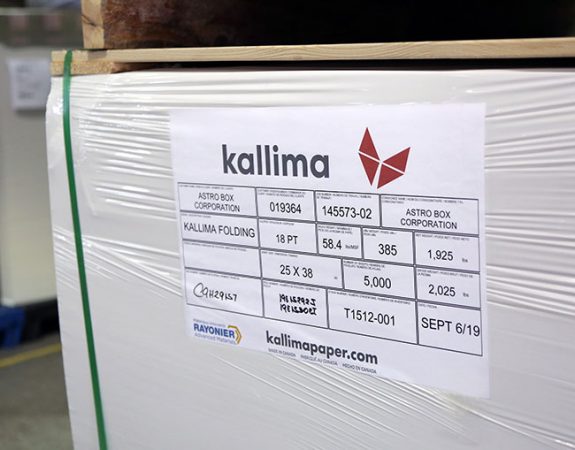
Manufactured by Rayonier Advanced Materials at the company’s paper mill in Temiscaming, Que., the lightweight Kallima box brand of paperboard provides significant sustainability advantages over thicker board grades while providing all the required strength and rigidity.
“Most of everything we buy for our business is priced in U.S. currency,” he points out. This naturally puts us under a lot of pressure when the Canadian dollar is as weak as it is now.
“That’s why buying this board from a Canadian company in Canadian dollars makes it an attractive option for us,” says Parlagreco, noting that Kallima box paperboard now accounts for nearly 10 per cent of all the grades that Astro Box processes at the facility.
“In the long run, using this board will help us increase our share of the U.S. export markets,” he says, citing the aforementioned New York Rangers and New York Knicks popcorn boxes that Astro Box now ships to Madison Square Garden, along with other new work that the company has been able to obtain by highlighting the environmental advantages of the FDA-approved (dry food contact) Kallima box to its client base.
“In addition to the basis weight advantage,” says Parlagreco, “it also has great printability, stiffness and smooth runnability.
“It provides an ideal surface for high ink coverage to enable us to execute complex print jobs,” Parlagreco extols, “and the material runs well through all stages of production: from printing and die-cutting to windowing and gluing.”
According to Parlagreco, the feedback from his customers to date has been overwhelmingly positive.
“Many of our customers have conducted tests and switched their entire product lines to Kallima because it runs well on their automated production lines,” he states.
“Many have seen improved efficiencies on their own lines,” he says, “and they also like the high-quality printing we are able to
achieve with Kallima box.”
Adds Laura Parlagreco: “Astro has always had a customer-centric vision. Our customers know that we’ll do whatever it takes to solve problems and meet deadlines,” she says, “and this hasn’t changed in 37 years of business.
“We work closely with our customers to develop solutions,” she expands.
“Whether it’s through prototyping and experimenting or spending time at their production facility to better understand their needs, we fully immerse ourselves when it comes to problem-solving, because seeing something first-hand is the best way to understand.
“We also understand that market conditions change quickly, so we don’t ask twice when our customers need a lightning-fast turnaround,” Parlagreco adds.
“That’s why we keep an open mind when it comes to scheduling and try to accommodate all our customers’ needs,” she states. “If our customers are happy, so are we.”
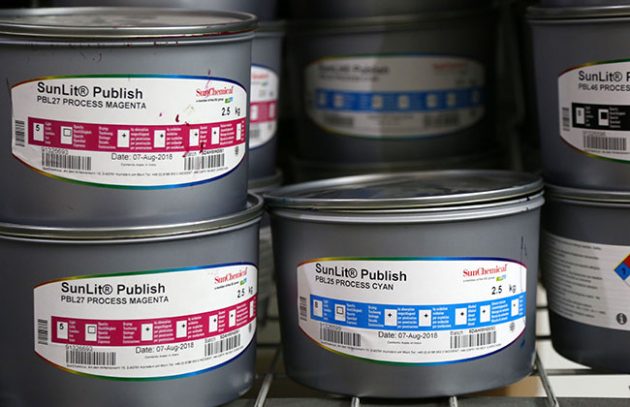
The Astro Box plant makes extensive use of high-quality, vegetable oil-based printing inks manufactured by Sun Chemical Corporation to produce bright and vibrant graphics on the Kallima box paperboard and other board grades printed on the Lithrone 40 press.
While Charles Parlagreco says he expects the plant’s Komori Lithrone 40 press to provide at least another five years of good service, he says the company is also benefitting from various capital investments it has made in the last five years, including the installation of two high-speed Bobst folder-gluers; an Iberica blanker and additional windowing machines.
“These additional investments have improved efficiencies, increased our throughput, and allowed greater schedule flexibility,” says Laura Parlagreco, while also drawing attention to the high degree of process automation implemented throughout all Astro Box operations.
“The beating heart of our operation is our ERP (Enterprise Resource Planning) system, a boutique system that is tailored to the folding carton industry. The ERP system encompasses daily tasks from estimating to inventory control, shop floor data collection, shipping and everything in-between,” she relates.
“Our shop floor capabilities include computerized make-readies, inline quality control with glue and window detection, and real-time data from the shop floor, which provides immediate feedback to management.
“Also, our Cloud-based customer portal links directly to our automated CTP and workflow,” she notes, “making pre-press a breeze.”
As Daniela Parlagreco happily adds, “Bringing the next generation into the business has provided Astro with a smooth succession plan for achieving our goal to grow the business, while maintaining high customer satisfaction levels.
“Given the worldwide attention and concern over pollution and climate change issues, there’s no doubt the focus has shifted towards more sustainable packaging solutions,” she states, “which is exactly what folding cartons offer.
“We feel that more and more business owners will continue to gravitate towards folding cartons,” she concludes, “requiring manufacturers like Astro to come up with creative solutions for their needs. Since this is how we’ve grown our business, we’re eager to rise to the challenge.”
– Photos by Naomi Hiltz
Advertisement

